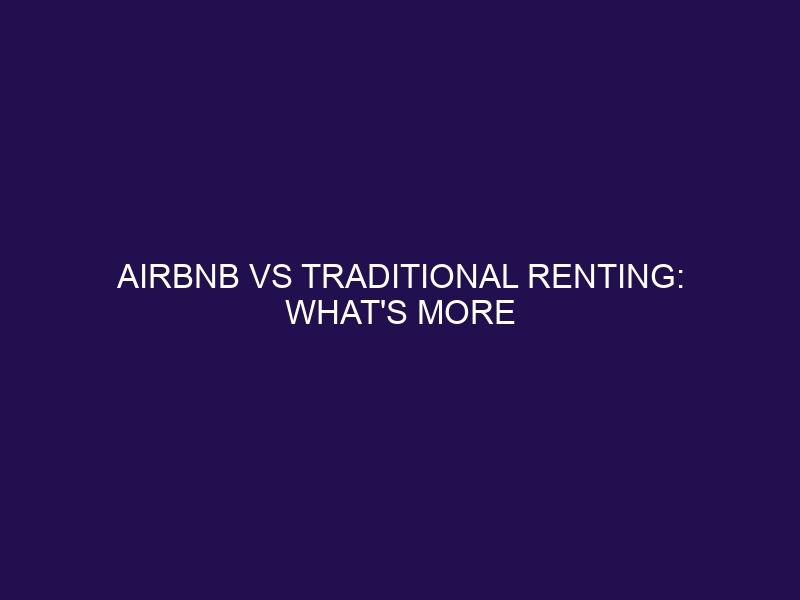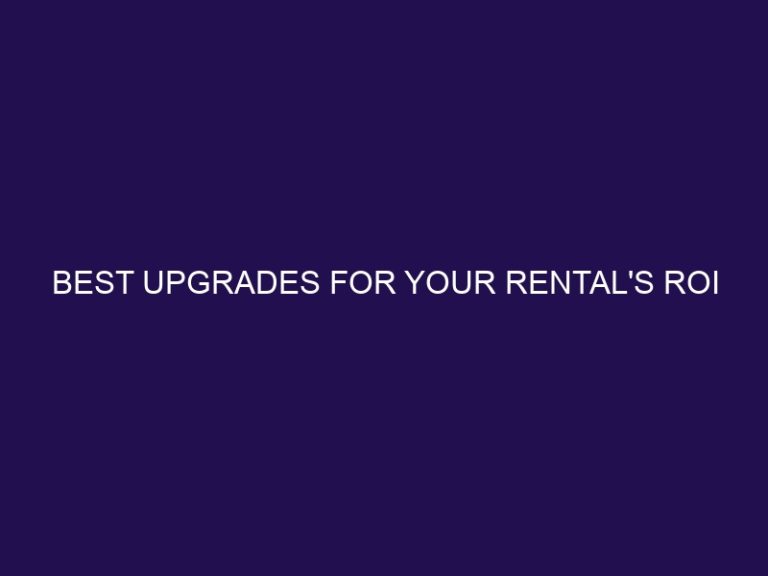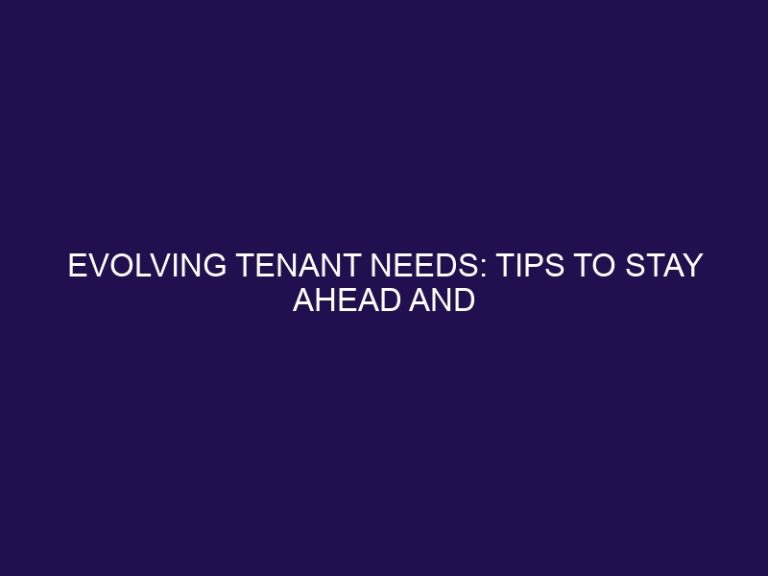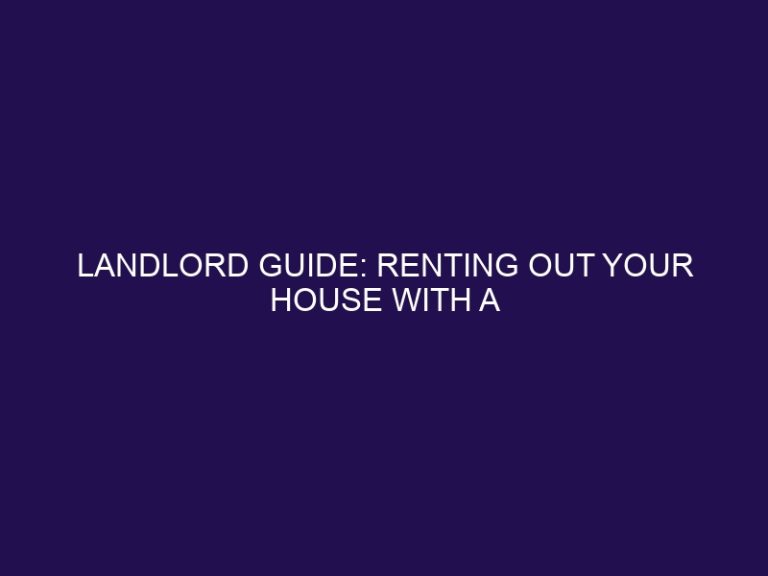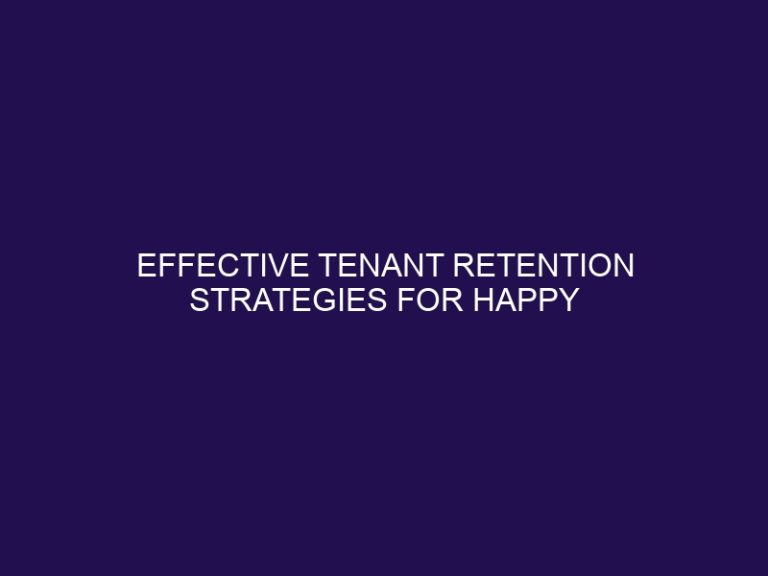Airbnb vs Traditional Renting: What’s More Profitable?
Airbnb, a popular online marketplace for short-term rentals, has revolutionized the way people travel and stay in accommodations. On the other hand, traditional renting refers to the more traditional long-term rental process through a landlord or property management company. While both options offer housing solutions, there are significant differences between the two. In this article, we will compare Airbnb and traditional renting to determine which option is more profitable for property owners.
Airbnb allows property owners to rent out their space to travelers for short periods, typically less than 30 days. This provides flexibility for both hosts and guests and allows for a more homely and local experience. Traditional renting, on the other hand, involves renting out a property for longer periods, usually a year or more, to a tenant through a leasing agreement.
There are key differences between Airbnb and traditional renting that have a significant impact on profitability. These include:
- Short-term vs Long-term Rentals: Airbnb allows for short-term rentals, while traditional renting involves long-term rentals. This means that with Airbnb, hosts can charge higher rates for shorter stays, while traditional renting provides a steady, but lower, monthly income.
- Flexibility in Rental Rates: With Airbnb, hosts have the flexibility to adjust their rental rates based on demand and season, while traditional renting often involves a fixed monthly rental rate.
- Furnishing and Maintenance Costs: Airbnb hosts are responsible for furnishing and maintaining their property, while traditional landlords typically provide furnishings and handle maintenance issues.
- Occupancy Rates and Seasonal Demand: Airbnb rentals may experience fluctuations in demand depending on the season and location, while traditional rentals tend to have a more consistent occupancy rate.
The profitability of Airbnb vs traditional renting ultimately depends on various factors, such as location, property type, and demand. In some cases, traditional renting may be more profitable, while in others, Airbnb may provide higher returns. For example, a property located in a popular tourist destination may see higher profitability with Airbnb, while a property in a suburban residential area may fare better with traditional renting.
In terms of risks and challenges, both Airbnb and traditional renting have their own set of potential issues. Airbnb hosts may face legal and regulatory issues, such as zoning laws and short-term rental restrictions in some cities. Traditional landlords may have to deal with property damage and insurance coverage, as well as managing tenant relationships and addressing any maintenance issues.
Ultimately, the decision between Airbnb and traditional renting depends on the individual’s specific goals and property. Factors such as location, property type, and personal preferences should all be considered when deciding which option is best for you. As with any investment, thorough research and proper understanding of the risks and challenges involved are crucial in making an informed decision.
What Is Airbnb?
Airbnb is a platform that connects individuals with guests who are looking to rent out properties or spare rooms. It provides a flexible and potentially profitable opportunity for people to monetize their extra space.
What Is Traditional Renting?
What Is Traditional Renting? Traditional renting is the process of leasing a property directly from a landlord or property management company for a set period of time, usually a year. During this time, tenants are responsible for paying a fixed rent amount and covering the costs of utilities and maintenance.
What Are the Differences Between Airbnb and Traditional Renting?
When it comes to renting out a property, there are two main options: Airbnb or traditional renting. While both may seem similar on the surface, there are distinct differences between the two that can greatly impact profitability. In this section, we will dive into the key differences between Airbnb and traditional renting, including the type of rentals offered, flexibility in rental rates, costs of furnishing and maintenance, and the impact of occupancy rates and seasonal demand. By understanding these differences, you can make a more informed decision on which option is best for you.
1. Short-term vs Long-term Rentals
- Duration: Short-term rentals typically last for days or weeks, while long-term rentals extend to months or years.
- Flexibility: Short-term rentals offer flexibility for property use, but long-term leases provide stability and consistent income.
- Management: Short-term rentals require frequent turnover, while long-term leases involve less frequent turnover and maintenance.
2. Flexibility in Rental Rates
Flexibility in rental rates sets Airbnb apart from traditional renting, giving hosts the ability to adjust prices according to demand, seasons, and events. For example, during local festivals, Airbnb hosts in the area often raise their rates to take advantage of the increase in demand.
3. Furnishing and Maintenance Costs
- Furnishing Costs: Airbnb may require a higher initial investment for furniture and decor in order to attract short-term renters.
- Maintenance Costs: Continuous cleaning and upkeep may be necessary for Airbnb properties, as opposed to traditional renting.
4. Occupancy Rates and Seasonal Demand
Occupancy rates and seasonal demand play a significant role in both Airbnb and traditional renting. During peak seasons, Airbnb may experience higher demand, while traditional renting offers more stable occupancy rates. It is essential to have a thorough understanding of local trends and tourism patterns to maximize profitability in both options.
Which is More Profitable: Airbnb or Traditional Renting?
The debate between Airbnb and traditional renting as a means of generating income has been ongoing in the real estate industry. In this section, we will dive into the topic of profitability and compare the two options based on various factors. Additionally, we will analyze real-life case studies and examples to provide a comprehensive understanding of which option may be more profitable in different situations. So, let’s take a closer look at the question: Airbnb or traditional renting – which is more profitable?
1. Factors to Consider in Profitability
- Evaluating rental demand and market trends to determine profitability
- Assessing the location and accessibility of rental properties to ensure profitability
- Calculating operational and maintenance costs accurately to maximize profitability
- Understanding the legal and tax implications of rental properties for optimal profitability
2. Case Studies and Examples
- Case studies and examples can offer valuable insights into the profitability and challenges of both Airbnb and traditional renting.
- Examining real-life scenarios can aid in understanding factors such as occupancy rates, rental income, and management costs.
- For instance, a case study comparing the short-term rental income on Airbnb with the long-term traditional renting in a specific location can provide practical financial data.
Consider researching case studies to gain a comprehensive understanding of the financial and operational aspects of both Airbnb and traditional renting.
What Are the Risks and Challenges of Airbnb and Traditional Renting?
As the popularity of Airbnb continues to rise, many property owners are considering this platform as an alternative to traditional renting. However, both options come with their own set of risks and challenges. In this section, we’ll discuss the potential legal and regulatory issues that may arise with Airbnb and traditional renting. We’ll also touch upon the risks of property damage and insurance coverage. Lastly, we’ll explore the importance of customer reviews and satisfaction for both options. By understanding the potential challenges, property owners can make an informed decision on which route to take.
1. Legal and Regulatory Issues
- Research local zoning laws and homeowner association regulations to ensure compliance with all legal and regulatory issues.
- Understand tax obligations and regulations related to short-term rentals in order to avoid any legal issues.
- Comply with safety and accommodation standards set by local authorities to ensure adherence to all legal and regulatory requirements.
2. Property Damage and Insurance Coverage
- Property damage: Safeguard your property with comprehensive insurance coverage.
- Guest verification: Verify guest credentials and consider requesting security deposits.
- Regular inspections: Conduct routine property checks to identify and resolve any potential issues.
Did you know? Airbnb provides host protection insurance to cover any property damage that may occur during guest stays.
3. Customer Reviews and Satisfaction
Customer reviews and satisfaction are essential factors in both Airbnb and traditional renting. Positive feedback not only enhances the credibility of a property but also attracts more guests. It is equally important to address negative reviews promptly in order to maintain a good reputation. Thoughtful responses to feedback can ultimately result in improved customer satisfaction and retention.
Which Option is Best for You: Airbnb or Traditional Renting?
When considering the best option for you between Airbnb and traditional renting, take into account factors such as rental demand, maintenance costs, and desired level of involvement. For example, while Airbnb may provide higher returns, it also requires more active management.
Frequently Asked Questions
What is the difference between Airbnb and traditional renting?
The main difference between Airbnb and traditional renting is the length of stay for guests. Airbnb allows for shorter stays and quicker turnarounds, while traditional rentals typically have year-long leases. Additionally, Airbnb offers more flexible pricing options, allowing hosts to offer daily, weekly, or monthly rates and adjust prices as needed.
Which has more income potential: Airbnb or traditional renting?
Airbnb has the potential for higher income due to the ability to charge more on a nightly basis. Mashvisor’s latest data shows that the average monthly traditional rent in Seattle is $2,209, while the average monthly Airbnb income is $3,543. However, traditional landlords have a consistent cash flow, while Airbnb hosts have more flexibility in pricing.
What are the upfront fees and ongoing expenditures for Airbnb rentals?
Initial fees for Airbnb rentals may be larger due to the need for thorough furnishing and ongoing expenditures for property maintenance. Airbnb hosts also have to cover costs for decoration, bedding, furnishings, and everyday items. Other additional costs for Airbnb hosts include cable television, Wi-Fi, cleaning services, and service fees.
What factors should be considered before investing in Airbnb rentals?
Before investing in Airbnb rentals, it is important to consider the demand for both Airbnb and traditional rentals in the area. It is also important to factor in upfront fees and ongoing expenditures when determining the profitability of an Airbnb rental. Additionally, location and type of property can impact the decision between Airbnb and traditional rentals, as well as taxes and zoning laws.
What are the pros and cons of Airbnb and traditional renting?
The pros of Airbnb rentals include the potential for higher profits, flexibility in pricing, and the ability to cater to short-term vacation rentals. On the other hand, traditional rentals offer more stability and less financial responsibility. Cons of Airbnb include higher upfront fees and ongoing expenses, while cons of traditional renting include limited income potential and the need to find long-term tenants.
Is it possible to minimize risks and maximize profits with both Airbnb and traditional renting?
Yes, it is possible to minimize risks and maximize profits with both Airbnb and traditional renting. For Airbnb, hosts can minimize risks by thoroughly screening guests and investing in premium marketing to attract high-quality renters. For traditional renting, landlords can minimize risks by thoroughly screening tenants and regularly maintaining the property to attract long-term renters. In both cases, careful consideration of expenses and pricing methods can help maximize profits.

